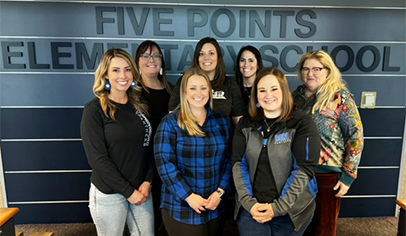The email arrived on one of those gray-shrouded winter days when light-starved people reposition their desk lamps in a desperate attempt to absorb vitamin D. The message was from a fellow parent asking for volunteers to help plan the 8th grade semiformal. Outside it was bone-cracking cold, but the words “June dance” propelled me forward into warm breezes and fragrant night air.
It was just what I needed to lift me out of my winter darkness. And even more important, it would shed some figurative—but no less vital—light on my daughter’s school. The opportunities to volunteer had dwindled as my daughter moved up the grades so by the time she entered a new building in 8th grade, they were all but gone. School had become a shadowy place populated by faculty, staff, and kids whose names I didn’t know.
That evening my daughter wandered into the kitchen while I was packing the next day’s lunches. I told her about the email.
She stiffened. “You can help out, but you are not going to chaperone.” The force of her words nearly knocked the peanut butter knife from my grip. I opened my mouth, but before I could speak, she added, “Because if you do, I’m not going.” She folded her arms across her chest and raised her eyebrows at me.
My first thought was, “Well, I guess that means you’ll miss the naked baby pictures I’ll be showing around to all of your classmates.” My second, almost simultaneous thought was of how when I was in 8th grade, the mere existence of my mother sent me into spasms of mortification. And my third thought was, Thank goodness I got in eight years of volunteering at my daughter’s schools before she slammed the doors shut on me. And thank you, too, to the PTO, which opened the doors in the first place, invited me in, and gave me something to do.
I nearly didn’t join the PTO. I figured all of those women (and they were all women) already knew each other and wouldn’t want an outsider nosing around in their business. I didn’t think I fit the part of a PTO parent. I like kids, but not nearly as much as I like my own. I’m disorganized. I can’t bake, or cook, or keep track of money. But I wanted to find out what was happening in my daughter’s elementary school, so I went to a meeting. From there it was easy to volunteer (they passed a sheet around and I signed it), and pretty soon I learned two things: first, the PTO actually wants people to nose around in their business; and second, everybody fits the part of a PTO parent—even me.
Joining the PTO is a great way to learn about your child’s school and to meet other parents. But being an active member does so much more. Decades of studies have shown that children whose parents are involved in their education have higher grades and are more likely to graduate than those whose parents aren’t involved. They have better attendance, are more motivated, have higher self-esteem, and are less likely to use drugs and alcohol or engage in violent behavior. When it comes to academic achievement, parent involvement is more critical than income, education level, or cultural background.
There’s a payoff for parents and schools, too. Involved parents tend to feel self-confident and in control. They meet new people, which strengthens and expands their social networks. They become better educated about child development, and they tend to have positive rapport with the school. Teacher morale increases and schools become stronger.
Being involved with your child’s education doesn’t begin and end in the school, of course. Parents need to show interest in their children’s learning, read to them, and help with homework. But there’s something about going into the classroom to help the teacher, or making posters for science night, or supervising the kids at recess that tightens the relationship between home and school for everyone—parents, children, and teachers. When enough parents join the PTO and put their collective creativity, talents, skills, and resources toward the same objective, they’re capable of just about anything. I’ve belonged to two PTOs so far and have watched each perform magic many times over. Starting with nothing, they have created fairs and family nights, conjured programs and performances, bought equipment and supplies that make teaching easier or more interesting and school more fun. They’ve helped kids pay for field trips and thrown their organizing power behind campaigns to support our districts’ schools.
But, as I realized that day packing lunches in my kitchen, joining the PTO is a limited-time offer. If you don’t act soon, the opportunity will be lost forever. I’m so glad that I acted when I did. Because the eight years since my daughter had been a kindergartner had raced by and deposited her at the other side of childhood—the side that tilts much too steeply toward adulthood.
Of course, just because I’m the mother of a 14-year-old (which, by definition, makes me an embarrassment), I don’t intend to stop being involved in my daughter’s education. I’ll just have to look harder for more opportunities to get into her school. I’ve already assured her that when I find some, we’ll pretend we don’t know each other—just like I did with my mom.
Sharron Kahn Luttrell volunteers for parent groups at two schools in Mendon, Mass.















